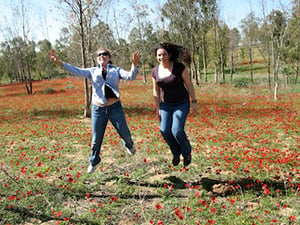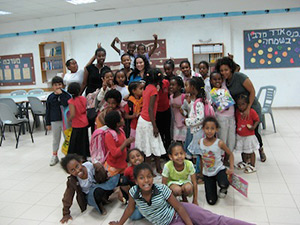
Highlights: There were a lot of highlights to the trip, however one of the main highlights was how connected I felt by the end, especially to my host family. I really tried my best to integrate into the communities I lived in and worked tirelessly on my Hebrew. I knew that learning Hebrew in Israel was my best chance at succeeding in being truly bilingual and that it would bring me closer to the people there. Among the people that helped me feel connected were my host family members and their extended family. I barely traveled on weekends during track 2 because all I wanted to do was hang out with the women that I met and learn how to cook from them, and then spend shabbats with them and their families, including my host family. I still keep in touch with them and really feel like they’re family. These women and families in Netivot helped me feel welcome and a part of the Jewish peoplehood and took me to participate in really special things like weekly Israeli folk dancing with a religious group of women.
Morning: Each track of the program looked a little bit different, but a typical morning during the first track consisted mostly of Hebrew class. I would wake up, have some breakfast, and go downstairs to a classroom in the absorption center. We had a great teacher for my class and would learn vocabulary and grammar, listen to the radio, sometimes watch movies, and come up with dialogues. Among the best parts of the morning experience was our teacher who was super sassy and personable and the breaks we took which allowed us to go back upstairs and eat fun Israeli snacks.
Afternoon: A typical afternoon usually meant making lunch or going out for food, then splitting off from most of the group and heading to a volunteer site. I always enjoyed going to sites with fewer OTZMA volunteers so that I could really get to know other people in the community and engage with them in a different way. A lot of my placements in the first two tracks were helping out with English classes or after-school programs, so I often took a bus to a school and worked with kids on the sidelines of a classroom, ran activities, or taught lessons.

Evening: Evenings during track one were my favorite. Typically we would cook dinner in small groups and then hang outside in the communal space of the absorption center. People often joked around and hung out, but I also would sit out there with my notebook. I made friends with some of the other students from the nearby college who also happened to live there. They were not only really nice and fun, but they put up with my many questions about Hebrew and helped me practice what I had been learning. This is the phase of the program in which I learned how to say “nerd” in Hebrew. Many nights we also would be go out as a group to a bar and spent time together.